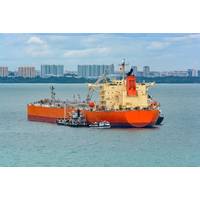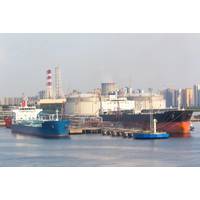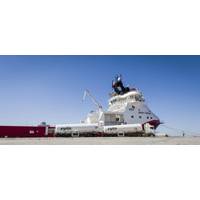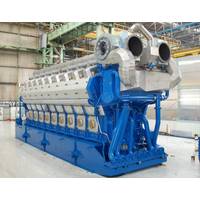IOC Sells IMO2020-Compliant Marine Fuel in India
State-owned Indian Oil Corp (IOC) said it has commenced delivery of Low Sulfur Furnace Oil (LSFO) for ships that is compliant with International Maritime Organisation's (IMO) mandate.The largest commercial oil company in India said in a press release that it commenced deliveries of LSFO with 0.5 per cent sulfur as marine fuel at ports in the country.The first such supply was made on 26th October 2019…
Ammonia as Marine Fuel ?
Ammonia can be safely and effectively applied as a marine fuel to reduce harmful emissions in the maritime industry according to new research published today (12 June) by C-Job Naval Architects, the largest independent ship design and engineering company in the Netherlands.The ground-breaking research uses a new concept design, an ammonia carrier fueled by its own cargo, to study the concept of using…
Study Shows LNG Forming Pathway to IMO 2050
Greenhouse Gas (GHG) reductions of up to 21% are achievable now from LNG as a marine fuel, compared with current oil-based marine fuels over the entire life-cycle from Well-to-Wake (WtW).An independent study report confirms that emissions of other local pollutants, such as sulphur oxides (SOx), nitrogen oxides (NOx) and particulate matter (PM), are close to zero when using LNG compared with current conventional oil-based marine fuels.The study…
US to Lead Oil Supply Growth to 2024
The United States is set to drive the global oil supply growth over the next 5 years, thanks to the strength of its shale industry, triggering a rapid transformation of world oil markets, according to the International Energy Agency (IEA).IEA said that oil exports from the United States will overtake Russia and close in on Saudi Arabia, bringing greater diversity of supply, by the end of the forecast.While global oil demand growth is set to ease…
LNG Meets IMO Goals: SEA\LNG
The consortium promoting the commercial case for liquefied natural gas (LNG), SEA\LNG, believes LNG is a viable pathway to meet the International Maritime Organisation (IMO)’s 2050 Greenhouse Gas (GHG) targets.The maritime industry really has two broad but major environmental initiatives related to air emissions; dramatic improvement of global air quality, and reduction of GHGs, said a release from…
Spliethoff Gets Green Loan From ING, EIB
Dutch banking group ING and the European Investment Bank said they will provide a EUR 110 million ($123 million) loan to Dutch ship management firm Spliethoff’s Bevrachtingskantoor B.V. for retrofitting vessels with exhaust gas cleaning systems.According to a European Commission press release, Spliethoff will use the loan to retrofit 42 of its vessels with exhaust gas cleaning systems and ballast water…
'World's First' Zero Emission Marine Biofuel Test Successful
Netherlands-based supplier of sustainable low carbon marine fuels GoodFuels Marine in conjunction with bulker and tanker owner and operator NORDEN A/S, has successfully completed trials of the world’s first zero emission, ‘drop in’ Heavy Fuel Oil (HFO)-equivalent marine biofuel – almost entirely reducing all carbon and sulphur emissions.A press release from the pioneer in sustainable marine fuels…
Shipping Emission to Increase Up to 250% by 2050, ITF Warns
Maritime transport emitted 938 million tonnes of CO2 in 2012. This represented 2.6% of total global carbon emissions, said International Transport Forum (ITF)By 2050, shipping CO2 emissions are projected to increase between 50% and 250% if no drastic action is taken, the forum warned.In order to reverse this trajectory, the 174 member states of the International Maritime Organisation (IMO) adopted…
Arkas Bunkering, Sumitomo Corporation in LNG Bunkering Deal
Arkas Bunkering have signed a protocol with Japan-based Sumitomo Corporation for the use of liquefied natural gas (LNG) as bunker fuel in Turkish and nearby seas. As environmentally-friendly buildings, vessels and fuels have become more popular than ever, new applications acting as reminders for both states and civil initiatives of their environmental responsibilities continue to emerge. With International Maritime Organisation’s (IMO) global sulphur cap set to enter into force in 2020…
Advance Information of Berths in Ports Can Cut Cost and Emission
If seagoing vessels were better informed about the availability of berths and adapted their speed accordingly, substantial savings could be made in terms of fuel and CO2 emissions. This conclusion is based on a study that was recently commissioned by the Port of Rotterdam Authority and research institute TNO.The study pointed out that if sea-going vessels are regularly kept informed – particularly during the last twelve hours before arrival – about exactly when their berth will become available…
Exxon Mobil Eyes Major Investment at Singapore Refinery

Exxon Mobil Corp is considering a multi-billion dollar investment at its Singapore refinery, the company's largest, ahead of new global shipping fuel regulations starting in 2020, a senior executive said on Wednesday."We are currently assessing a multi-billion project in our integrated manufacturing facility here in Singapore," Matt Bergeron, vice president of Asia Pacific Fuels Business at Exxon, said at a bunkering conference."Should the project proceed…
Hapag-Lloyd on 2020 Low Sulphur Fuel
LSF2020 refers to the new “Low Sulfur Fuel” regulations, which will come into effect on 1 January 2020.These regulations are the biggest of a series of steps by the International Maritime Organisation (IMO) to reduce marine pollution (MARPOL) in response to the threat of climate change.The LSF2020 emission regulations mean ships will have to significantly reduce emissions on the high seas as well as in coastal areas.
IMO Rules a Cliffhanger for Oil Storage -Vitol's Chris Bake

Vitol executive committee member Chris Bake says a big question facing oil storage sector is how world handles new International Maritime Organisation rules for cleaner shipping. New IMO rules to slash the use of high sulphur fuel oil in global shipping will come into effect in 2020. "It's going to be more and more difficult to burn that fuel oil with more economies going to natural gas for power," he said. "(Lower sulphur) marine gasoil has to build ahead of 2020.
S.Korean Refiners Look to Cash in on 2020 Mandate
Three refiners to spend more than $5 bln to upgrade or add units. South Korean refiners are planning to spend over $5 billion on plant upgrades in response to tighter rules on shipping fuel, boosting production of low-sulphur fuel oil as well as other high-end products. The refiners hope the investment, which comes ahead of the 2020 introduction of the new rules, will make them one of the biggest beneficiaries of the new regulations, with many competitors still waiting to commit to new spending.
LNG Bunkering Commences in Australia

Under an agreement with Woodside, EVOL LNG refueled the platform supply vessel, Siem Thiima, on January 23 at King Bay Supply Base near Dampier. Business Manager, Nick Rea sees it as just the beginning. “Our decision to enter the LNG bunkering market is part of a long-term strategy that recognizes environmental and economic sustainability of LNG as a transport fuel,” said Rea. “It also recognizes that…
Bernhard Schulte, Babcock Team-up to develop GSV Vessel
Bernhard Schulte Shipmanagement (BSM), a leading global maritime services company, and Babcock International Group, the UK’s leading engineering support services company, are collaborating to develop a ground-breaking Gas Supply Vessel (GSV). The 7,500m³ vessel, which will be used for the LNG fuelling of ships, including ferries, containers, cruise vessels and other shore-based gas consumers in the Baltic Sea, is the first vessel of its kind to utilise Babcock’s market leading FGSV0 technology.
ExxonMobil Inks Deal to Collaborate on Caledonia LNG Project
ExxonMobil, Babcock International Group, Bernhard Schulte Shipmanagement (BSM), Calor and Orkney Islands Council have signed an agreement to collaborate in the “Caledonia LNG ” project. The aim is to develop the infrastructure, storage and technical support needed to enable safe liquefied natural gas (LNG) operations for customers in the north of the UK and North Sea, including bunkering. The parties…
LNG Not a Solution for Reducing GHG
Liquefied natural gas is not a panacea to reducing greenhouse gas emissions and its increasing use as a marine fuel could be worse for the environment than burning heavy fuel oil. Adams, a Fellow of the Institute of Marine Engineering, Science & Technology who now heads the Association of Bulk Terminal Operators, said: “The energy content of LNG is slightly more than half that of fuel oil, so to extract…
WPCI Launches Website Focused on LNG as shipping Fuel
The website www.lngbunkering.org is launched that features Liquefied Natural Gas (LNG) as a shipping fuel. The website is an initiative of the World Ports Climate Initiative (WPCI) LNG Fuelled Vessels Working Group under the auspices of the independent, non-profit International Association of Ports and Harbours (IAPH). The website provides a detailed overview of the use of LNG as ship fuel and illustrates the technical requirements for ships…
Wärtsilä's Gas Engine Technology Enhanced

Wärtsilä has now sold more than 2000 of its gas fuelled engines, which together have accumulated more than 7 million operational running hours in both land-based and marine applications. These milestone achievements emphasise the global position that Wärtsilä has achieved in gas and dual-fuel (DF) engine technology. "Wärtsilä's gas and dual-fuel engine technology can be used in all vessel types, and installed both in newbuilds and as conversion projects in existing ships.
